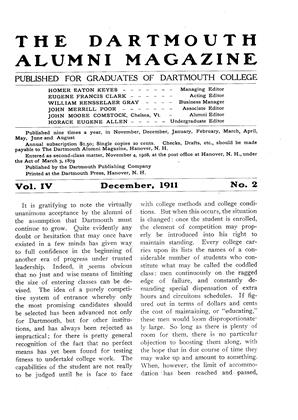In spite of a change of the date of the intercollegiate debates from the first to the last week in March, preparation for the selection of teams was begun earlier than usual. On the sixth of last month C. E. Snow '12, president of the debating union, called a meeting of candidates and outlined plans for the season. Fifty-four men chose questions and sides for the preliminary trials. At a meeting of representatives of Brown, Williams, and Dartmouth held early in the year, several important alterations besides that of date were made in drawing up the 1911-12 agreement. The most important change has to do with the method of choosing judges. Heretofore graduate committees in New York and Boston have picked the boards of judges from lists of nominees presented by the three colleges. The system was awkward and did not give satisfaction.
According to the new arrangement the visiting team will submit a list of eighteen names arranged in three groups of six ; the first to be made up of exvarsity debaters from at least three different colleges, the second to include at least three ex-varsity debaters, and the third to be composed of college presidents or professors. From this list the home team must select one of each group, except that any team has the right' to force a two to one majority of ex-varsity debaters on any board before which it is to debate.
To secure a decision directly on conclusion of the debate, the consultation of judges was done away with. It was further held that a decision representing the individual convictions of the judges is desirable.
Brown proposed that inasmuch as all but a very few debates in the past have been decided in favor of the affirmative that it would be advisable to give the visiting team the advantage of that, side to offset the home team's advantage of a familiar audience. The proposal was adopted.
But four members of last year's teams remain in College. ,D. B. O'Connor debated against Brown at Providence, C. E. Snow and A. K. Lowell helped defeat Williams at Hanover, and H. J. Mosier was alternate at the first mentioned debate.
From the fifty-four candidates who entered the preliminaries now in progress, twelve will be chosen. These with the four former team men will compete in final trials for the six team and two alternate positions.
Dartmouth is to take the affirmative at Williamstown next spring, and to meet the Brown affirmative team at Hanover. Last year the home teams won all around, but Dartmouth is champion because of a double victory two years ago.
A subject for the three simultaneous debates has not yet been selected. The debates will be held on the evening of March 21.
 View Full Issue
View Full Issue
More From This Issue
-
 Article
ArticleTHE RECENT GROWTH OF DARTMOUTH A PARTIAL RECOVERY OF POSITION
December 1911 By William Jewett Tucker, '61 -
 Article
ArticleIt is gratifying to note the virtually
December 1911 -
 Article
ArticleREMINISCENCES OF PROFESSOR SHURTLEFF
December 1911 By Josiah Whitney Barstow, '46 -
 Article
ArticleFOOTBALL
December 1911 -
 Class Notes
Class NotesCLASS OF 1907
December 1911 By Thacher W. Worthen -
 Class Notes
Class NotesLOCAL ASSOCIATIONS
December 1911








